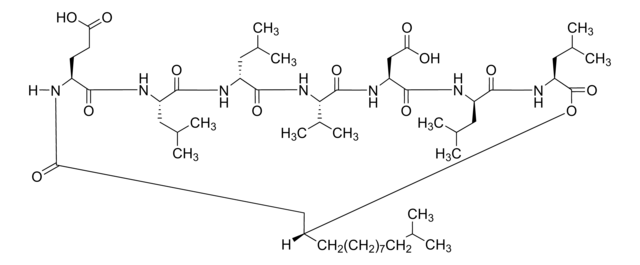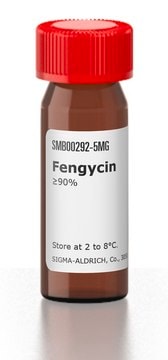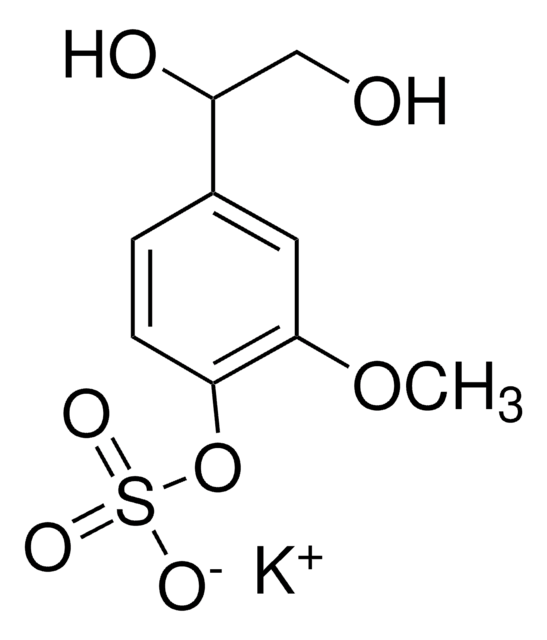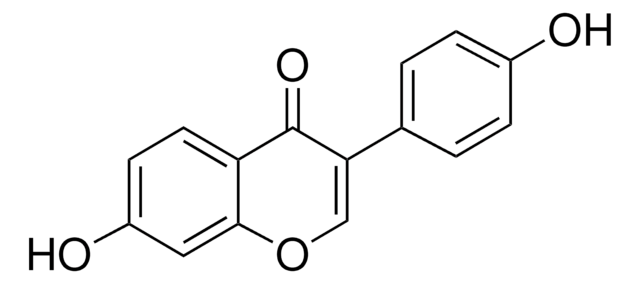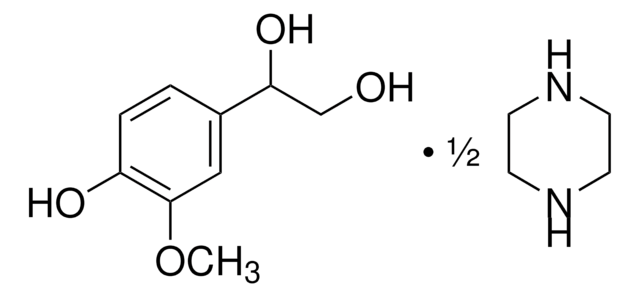I1774
Iturin A from Bacillus subtilis
≥95% (HPLC), suitable for microbiological culture
Sign Into View Organizational & Contract Pricing
All Photos(2)
About This Item
Recommended Products
product name
Iturin A from Bacillus subtilis, ≥95% (HPLC)
biological source
Bacillus subtilis
Quality Level
Assay
≥95% (HPLC)
form
powder
technique(s)
microbiological culture: suitable
color
white to yellow
solubility
ethanol: soluble 9.80-10.20 mg/mL
antibiotic activity spectrum
fungi
Mode of action
cell membrane | interferes
storage temp.
2-8°C
Application
Iturin A was used in the study of Bacillomycin D (an iturin with antifungal activity against Aspergillus flavus).
Biochem/physiol Actions
IturinA exhibits strong antifungal activity against pathogenic yeast and fungi. It interacts with the cytoplasmic membrane of the target cell forming ion conducting pores. Its mode of action could be attributed to its interaction with sterols and phospholipids. The compound causes the release of exo-vesicles from human erythrocytes.
Other Notes
A family of lipopeptides characterized by a heptapeptide cyclized with a C13-C17 β-amino fatty acid. Composed mainly of C14-C15 β-amino acids.
Storage Class Code
11 - Combustible Solids
WGK
WGK 3
Flash Point(F)
Not applicable
Flash Point(C)
Not applicable
Personal Protective Equipment
dust mask type N95 (US), Eyeshields, Gloves
Certificates of Analysis (COA)
Search for Certificates of Analysis (COA) by entering the products Lot/Batch Number. Lot and Batch Numbers can be found on a product’s label following the words ‘Lot’ or ‘Batch’.
Already Own This Product?
Find documentation for the products that you have recently purchased in the Document Library.
Customers Also Viewed
Jun Yuan et al.
Journal of chromatography. B, Analytical technologies in the biomedical and life sciences, 879(26), 2746-2750 (2011-08-30)
Iturin A, a powerful antifungal surfactant, is a kind of bacterial lipopeptide produced by Bacillus strains. This study addresses the use of an aqueous two-phase system (ATPS) using ethanol/ammonium sulfate to extract iturin A from Bacillus amyloliquefaciens NJN-6 fermentation broth
Minakshi Grover et al.
Current microbiology, 60(2), 99-106 (2009-09-25)
Bacillus subtilis strain RP24, isolated from rhizoplane of field grown pigeon pea, exhibited in vitro antagonism against a wide range of phytopathogenic fungi. An attempt was made to partially purify and characterize the diffusible antifungal metabolite/s produced by the strain
Chie Niisawa et al.
The Journal of general and applied microbiology, 54(3), 149-158 (2008-07-26)
A composting product of marine animal resources has been used as a fertilizer and a soil conditioner in Japan. This compost was produced by a repeated fed-batch fermentation system with three successive aerobic bioreactors. Composting temperature reached about 75 degrees
E Jourdan et al.
Molecular plant-microbe interactions : MPMI, 22(4), 456-468 (2009-03-11)
Multiple strains of Bacillus subtilis were demonstrated to stimulate plant defense responses, and cyclic lipopeptides may be involved in the elicitation of this induced systemic resistance phenomenon. Here, we further investigated molecular events underlying the interaction between such lipopeptides and
Katarzyna Czaczyk et al.
Polish journal of microbiology, 57(4), 313-319 (2008-01-01)
Cell surface hydrophobicity (CSH) is recognised as a important factor in microbial adhesion to solid surfaces. Growth conditions have been found to determine the synthesis of extracellular molecules by microorganisms. It has major consequences in modification of bacterial surface properties
Our team of scientists has experience in all areas of research including Life Science, Material Science, Chemical Synthesis, Chromatography, Analytical and many others.
Contact Technical Service